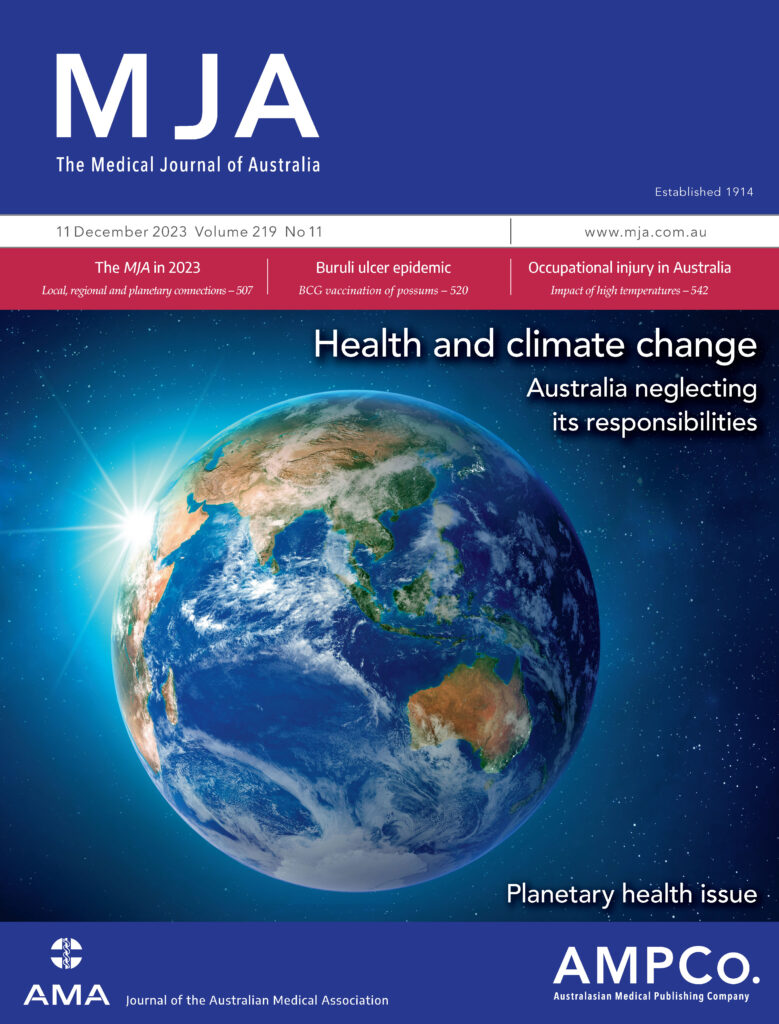The health impacts of climate change are in the spotlight, with the latest issue of the Medical Journal of Australia highlighting the urgent need for action to protect the health of the planet.
The special planetary health issue replaces the once-regular Christmas edition of the MJA, says Professor Virginia Barbour, the Journal’s Editor-in-Chief.
“This issue of the MJA is dedicated to planetary health,” Professor Barbour said.
“The way that humans interact with our natural world is arguably the most pressing health challenge of our time.
“Six articles in the Journal address the myriad ways that human health and wellbeing critically depend on the Earth’s natural systems, the interlinked crises of climate change, biodiversity loss, and environmental degradation, and the responsibility that we all share for protecting and promoting a healthy and sustainable world.”

In the issue, a Perspective article explores a recent change by the Australian Medical Council to update the standards for both pre-vocational medical training and medical schools.
The standards now recognise the health impacts of climate change, the need for environmentally sustainable health practice, and planetary health.
“This welcome and necessary development comes as climate and environmental health indicators deteriorate,” Dr Catherine Pendrey and her colleagues wrote.
“All medical education institutions should now integrate planetary health into curricula to ensure the profession is equipped to respond to the unfolding planetary health crisis and realise environmentally sustainable health care.”
Dr Pendrey is a general practitioner and epidemiologist at the Australian National University.
“It is time to reorientate the training and practice of medicine to engage with these challenges,” she and her colleagues wrote.
“We can no longer ignore the broader planetary context that influences the pathogenesis of disease and its prevention and management.”
The issue also unpacks The Lancet Countdown on health and climate change, which is a multidisciplinary, international collaboration monitoring the links between climate change and health. The Countdown is to the year 2030, tracking progress as the world moves towards the greenhouse gas emissions reduction commitments under the Paris Agreement.
The local Australian MJA–Lancet Countdown is the subject of an Editorial, with researchers arguing Australia is “world leader in neglecting its responsibilities.”
Although Australia’s susceptibilities to climate change are well understood, the country is falling behind other areas of the world, write Associate Professor Paul Beggs from Macquarie University and Professor Ying Zhang from the University of Sydney.
“It is therefore an indictment of Australia and its citizens that the 2023 global Lancet Countdown report shows that we lead all other regions of the world in per capita greenhouse gas emissions from our energy sector, with, on average, each of us contributing significantly to the changing climate and the death and disease it is causing,” they wrote.
“The report also highlights that this extends to Australia’s health care sector, which has the eleventh highest per capita greenhouse gas emissions in the world.”
Read the current edition of the Medical Journal of Australia.
Subscribe to the free InSight+ weekly newsletter here. It is available to all readers, not just registered medical practitioners.

 more_vert
more_vert